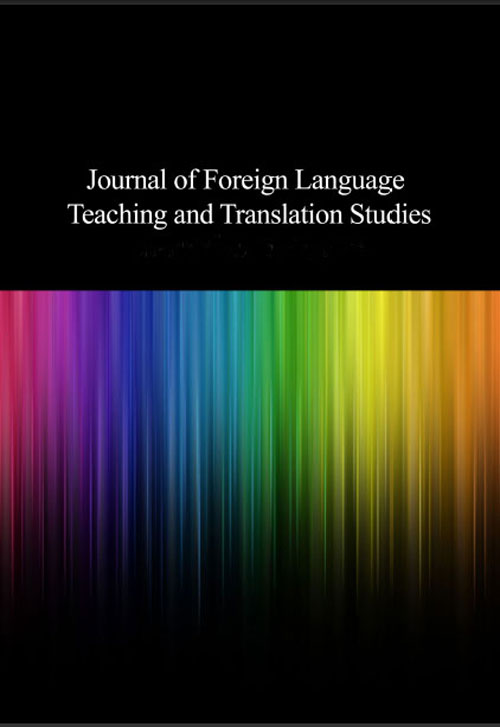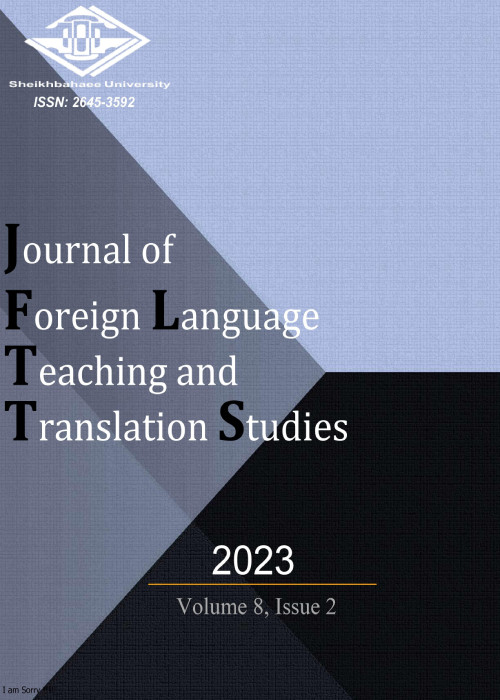فهرست مطالب

Journal of Foreign Language Teaching and Translation Studies
Volume:2 Issue: 1, Spring 2013
- تاریخ انتشار: 1396/12/20
- تعداد عناوین: 6
-
Page 1Whether negative evidence should be incorporated in or excluded from an SLA or FLA setting has long been a major concern for practitioners and researchers in the SLA and FLA domains. Some (Bowen, Madsen & Hilferty, 1985; Lightbown & Spada, 1990; Fathman & Whalley, 1990; Ferris & Roberts, 2001; Lyster & Ranta, 1997; Askew & Lodge, 2000; and Ashwell, 2000) endorse the use of corrective feedback while others do not (Krashen, 1982; VanPatten, 1988; Dekeyser, 1993; and Truscott, 1996). What these researchers; however, fail to take under advisement in this realm is learners and teachers Attitudes towards Error Correction (ATEC). The present experiment wishes to address the issue from this angle, i.e., how teachers and learners attitude converge and/or diverge as far as their attitude towards error correction is concerned. Some 410 students and 34 teachers were invited to fill out the questionnaires. Additionally, 45 students and 13 teachers were interviewed to delve into the versatile facets of error treatment qualitatively. The results showed which error treatment techniques the students and the teachers most and/or least favored. Not only does the analysis of the data support Vahdani and Mirsaidi's (2007) claim on student's ATEC, but also data analysis suggests common grounds can be detected between student's attitudes and those of their teachers. It can, therefore, be concluded that corrective feedback has won the favor of learners and teachers and that in their now statistically tenable estimation it should be factored in FLA settings.Keywords: Attitude, error correction, corrective feedback
-
Page 2Being able to communicate effectively is the optimal goal of all language learners; therefore, despite difficulties they face and restrictions they have while expressing themselves, they rely on employing diverse communication strategies (CSs).
This descriptive study was set to analyze Iranian EFL learners use of CSs in oral and written performances at two levels of proficiency. To this end, 60 university students of EFL were selected and assigned to two distinct groups. The participants oral and written performances were analyzed quantitatively and qualitatively using Dornyeis (1995) taxonomy of CSs.
The results of the study revealed that the context of communication plays a significant role in the use of communication strategies. The use of CSs by participants significantly varied by their level of proficiency. The most frequent problem areas were 'lexical gaps', 'problems in discourse management', and 'uncertainty in conveying the message', which can be considered by language teachers and material designers.Keywords: Interlanguage, communication strategies, communica-tive competence, strategic competence, oral performance, written performance -
Page 3Written Teacher Feedback (WTF) aims at improving the student's writing. Hence, the way in which it is provided for the learners should be taken into account as it makes an impact on the learner's comprehension of the presented comments (Ferris, 2003; Thonus, 2002). The current study was conducted to examine the possible effect of WTF directness types on Iranian EFL learner's ability to perceive the teacher's comments as praise or criticism and the required correction implied in them. To this end, three versions of the same essay, with direct, indirect and hedged comments indexed within them were distributed to 120 EFL learners. The results of ANOVA revealed that the directness type of the WTF would make no significant impact on Iranian EFL learner's ability to perceive the positive and negative comments and their required correction accurately. We might speculate from the findings that writing instructors should focus more on the quality of the WTF rather than its directness type in Iranian context. This would hopefully empower the learners to apply the teacher's comments to enhance the quality of their written products.Keywords: Direct speech act, directness types, hedged comment, indirect speech act, written teacher feedback (WTF)
-
Page 4The present study sought to examine the linguistic and discoursal features in the language of the text messages created by Iranian EFL learners. To this end, 400 text messages were collected from both genders. The contents of the collected data were analyzed in terms of linguistic features as well as discoursal features. The results highlighted the important role of gender in linguistic and discoursal features of text messages created by Iranian mobile phone users. More specifically, females use of complex sentences, formal opening and closing, and expression of thoughts, feelings, and emotions in their messages were much higher than men who created simple, short and to the point messages. The findings of this study highlight the role of text messages as a pedagogical tool since they are widely used to send or receive learning or information contents.Keywords: Discoursal features, gender, linguistic features, short message service, text messages
-
Page 5In this study, corpus-based techniques were utilized in order to investigate the quantitative and qualitative features of adjectives across literary and technical texts. The corpus was composed of five literary novels and five engineering academic books in English. Seventy paragraphs were randomly drawn from each corpus and the frequency distribution of adjectives with respect to their position (attributive, predicative) and syntactic functions (descriptive, verbal, numeral, etc.) were tallied and summed.
The results revealed that there is a significant difference in the frequency use of adjectives across the two corpora. From a register perspective, the high frequently use of adjectives in technical texts in comparison to literary texts (67.3% and 32.7%, respectively) may be due to the fact that almost all technical texts employ expository linguistic features which have a generally informational purpose, while most novels employ narrative‟‟ linguistic features which have a direct functional association with the communicative purpose of telling a story of events which have occurred in the past. From a genre perspective, academic texts in engineering tend to be highly informational, non-narrative, and characterized by an impersonal style, whereas novels generally share the same primary communicative purpose of narrating a story whose purpose is to entertain.Keywords: Corpus analysis, adjectives, literary texts, technical texts, expository, narrative -
Page 6Postcolonial texts seek to rewrite the mythical narratives of vampires to problematize the power relations between the colonizer and the colonized. The vampire tradition is inscribed and recycled according to the collective Oriental heritage to articulate the untold stories of the muffled Eastern subject. Drawing on the mythical narratives of the ghoul (ogre) in classical Arabic culture and old Arabic folktales and of Lord Shiva in the Hindu myth, this paper compares the rewritings of the vampire topoi of otherness, unspeakableness, foreignness, and border existences in both Emile Habiby's Saraya, The Ghoul's Daughter (1991) and Bharati Mukherjee's Jasmine (1989). The metamorphosis of Saraya into a laughing muse and Jasmine into a potent goddess can be taken to represent the liminal state of Dracula between life and death on the one hand and the convergence of cultures on the other hand. Where these two works differ principally is in the geographic location of this site of cultural interaction. Whereas Habiby (1922 1996), the Palestinian writer, traces the predicament of Arabs in Israel and the Palestinian diaspora, Mukherjee (1940-), the Indian American writer, writes of the potential synthesis of Indian and American culture in the context of globalization.Keywords: Postcolonial literature, vampire, mythical narratives


